

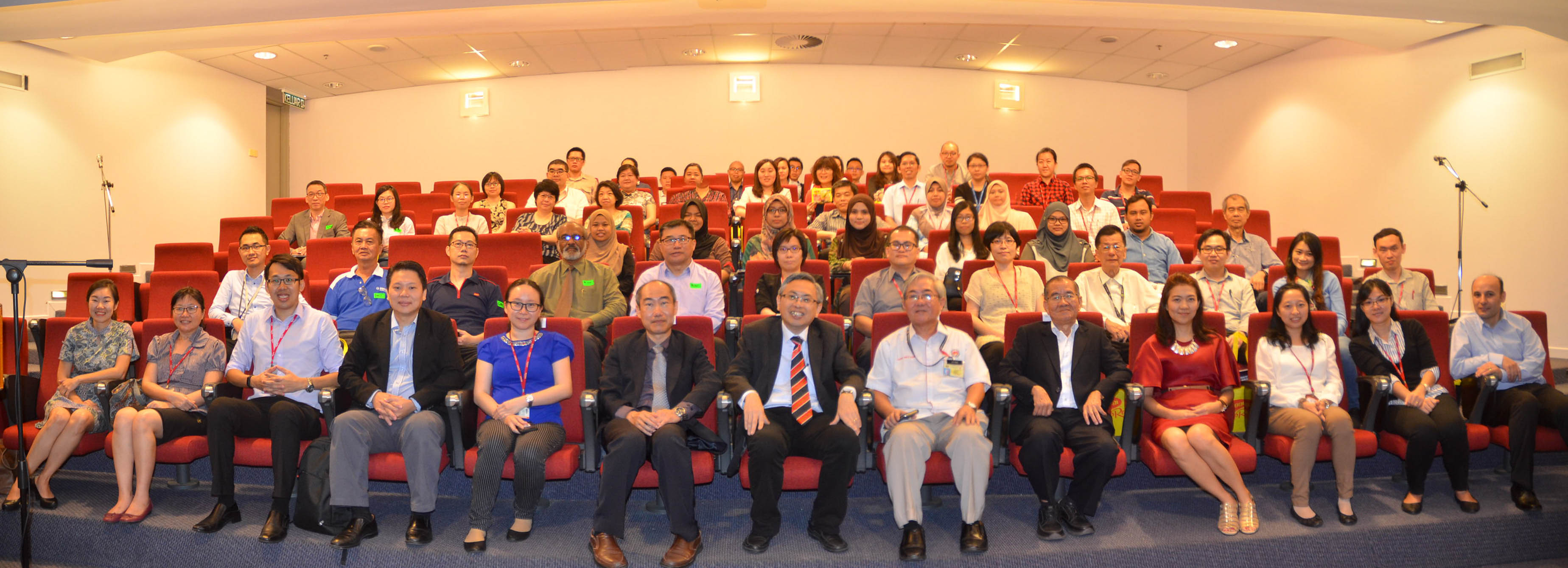
Committee members of the project with the participants
UTAR Faculty of Science (FSc) held its inaugural launching of the Community Project for Food Industries on 4 October 2017 at the Kampar Campus.
Present at the launch were UTAR Vice President for Internationalisation and Academic Development Prof Ir Dr Ewe Hong Tat who represented UTAR President Ir Prof Academician Dato’ Dr Chuah Hean Teik, Deputy Director of Perak State Health Department Leong Siew Hong, Operation Director of Bidor Kwong Heng Sdn Bhd Teh Hing Yong, FSc Dean Assoc Prof Dr Lim Tuck Meng, FSc Department of Agricultural and Food Science Head Dr Tan Yen Nee, consultants for food companies Lam Ah Chye and Lai Mun Lee, sponsors, UTAR industry partners, and staff.
“As consumers ourselves, we understand that food safety and hygiene affect us directly and in the food manufacturing, food safety and hygiene are extremely important. Therefore with this project, we aim to upgrade the food safety and hygiene standards of operation as well as to establish useful networks between the academics and food industries for the application of food safety and hygiene,” said Dr Tan, when introducing the project to the participants.
She later mentioned that through the project, skills in applying scientific knowledge and available technology to promote food safety and hygiene will also be included in the students’ discipline, so that they will be able to apply these practices during their employment, whether in big or small food companies all around Malaysia.
A university by the people, for the people, UTAR also takes pride in having scientists and technologists on board to extend their knowledge to the surrounding community for the general advancement of the society, and with the programme acting as a bridge between the academia, food industries and the community at large.
During his opening speech, Prof Ewe likewise expressed his concern towards food safety and hygiene practices in the food industries and the need for them to address the importance of keeping food safe for consumption.
“The World Health Organisation (WHO) reported that every year, about 420,000 people die after eating contaminated food, 120,000 children die from foodborne diseases and 33 million people have their long-term health affected because of these contaminations. This is certainly not a light matter of having few stomach cramps as these contaminations can cause death. Contaminated food can also cause more than 200 diseases. Therefore, we need to learn how we could help save lives with food safety practices,” urged Prof Ewe.
He added, “We must understand and learn about the causes of these food contaminations, find solutions, educate the public and maintain a healthy environment for the society to live in. Therefore, ensuring food safety and hygiene is a multisectoral and multidisciplinary effort by the government departments, agencies, public, agriculture, education and trade, working together to form a network of communication and collaboration.”
Later, Lam, one of the initiators of the project, was invited to present an overview, which included some of the functions of the project. According to Lam, the project will provide mentors consisting of experienced consultants, UTAR lecturers from the Food Science field, State Health authorities, members of the Halal Development Centre (HDC) and service provider, to bring essential information to the food industries.
Classroom-type lectures with case studies will also be included for the participants of the project to have in-depth understanding of the processes involved in ensuring food safety and hygiene, and will see on-site assistance provided to selected factories who require consultancy services and certification advice as well as to conduct a refresher course for Hazard Analysis and Critical Control Point (HACCP) certified companies.
Meanwhile, Leong enlightened the participants about the importance for food industries to comply with the food act and regulations to avoid violations that could compromise their food safety and hygiene practices. He also advised the academics to encourage the students to be mindful of the food regulations because understanding the law could provide essential assistance to the company, especially when it is questioned by the authorities, and has proven valuable to their employment when working in food companies.
Lai, on the other hand, gave insights about the Food Mentoring Programme to the participants, which will provide one-day training on food safety, including Good Manufacturing Practices (GMP) and HACCP Awareness Trainings, and workshops; while Teh shared about the significance of food safety and hygiene practices to the company’s reputation and recognition as well as to gain consumers’ trust.
In the closing speech, Dr Lim expressed his gratitude to the food industries and participants for the support given and conveyed his hope to the food industries to consider UTAR students as suitable employees, whether for internships or permanent employment.
“It is an honour to have all of your support for this project and to see us coming together for the benefit of the society. The reason why we based this project in Kampar is because Kinta Valley is one of the major food productions areas and so we want to engage and help the smaller food players for the benefit of the consumer, through food safety and hygiene practices. We certainly hope to see as many food industries from the agricultural sectors, food manufacturing & food processers from the small and cottage industries, to food service operators and retailers joining this program to make the food safer for our consumers, not only those in Kampar, but throughout Malaysia and export markets. Safe Foods always make good business. Therefore, we also welcome collaborations and we look forward to hearing ideas, suggestions and feedback from you,” said Dr Lim.
The launch ended with a souvenir presentation by Dr Lim to Leong and Teh as tokens of appreciation.
The committee members of the project were UTAR academics Dr Lim, Dr Chang Ying Ping, Dr Lye Huey Shi, Dr Ong Mei Kying, Dr Tan, Dr Ali Yassoralipour, Silvara Junus, and Kuan Chee Hao, and from the food industries were Lam and Lai.
The project was sponsored by Perkin-Elmer Sdn. Bhd., Nestle Products Sdn. Bhd., Flowcreate Asia Sdn. Bhd., Empire Bioscience Sdn. Bhd., and Chemopharm Sdn. Bhd.
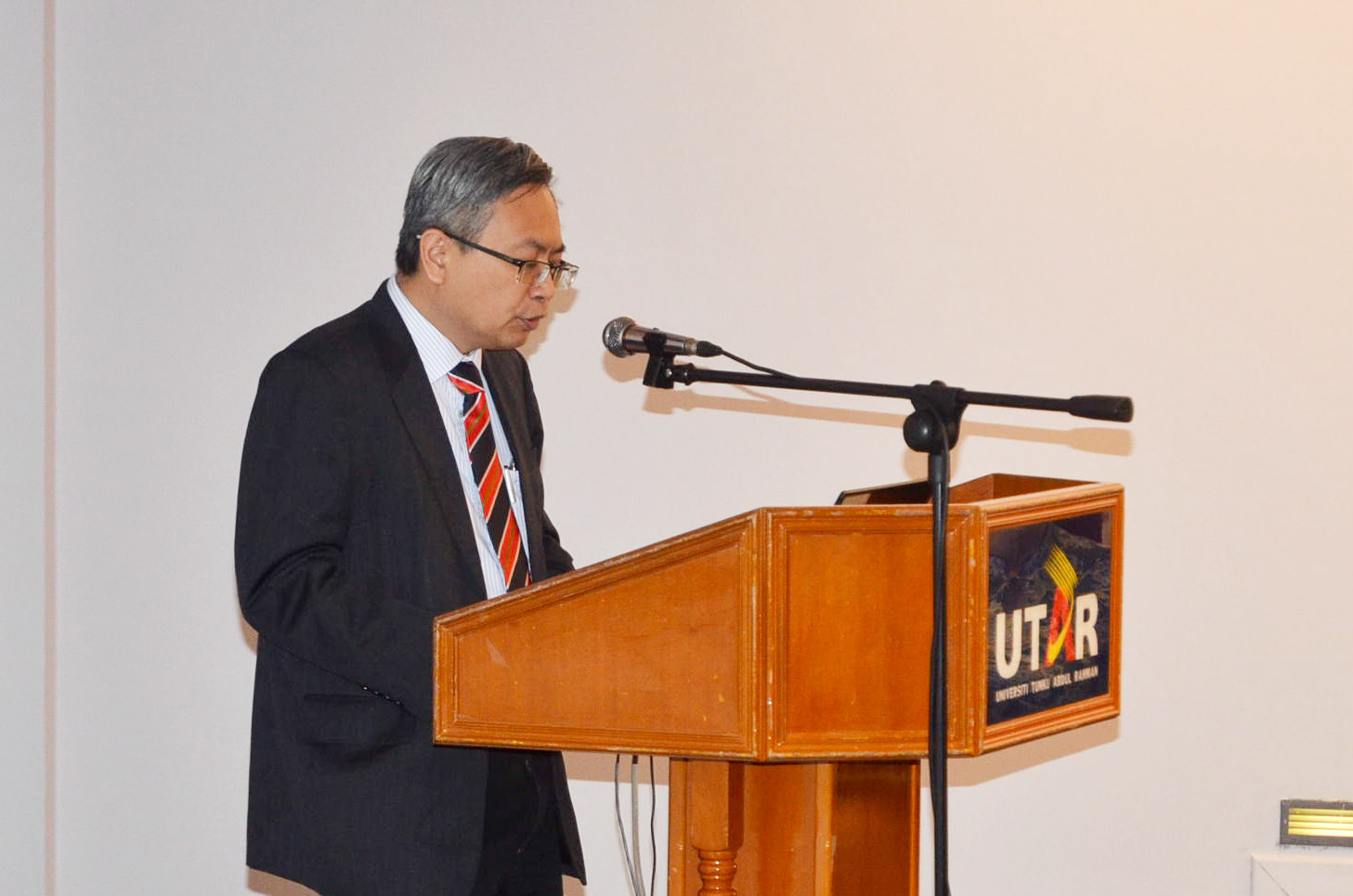
Prof Ewe delivering his opening speech
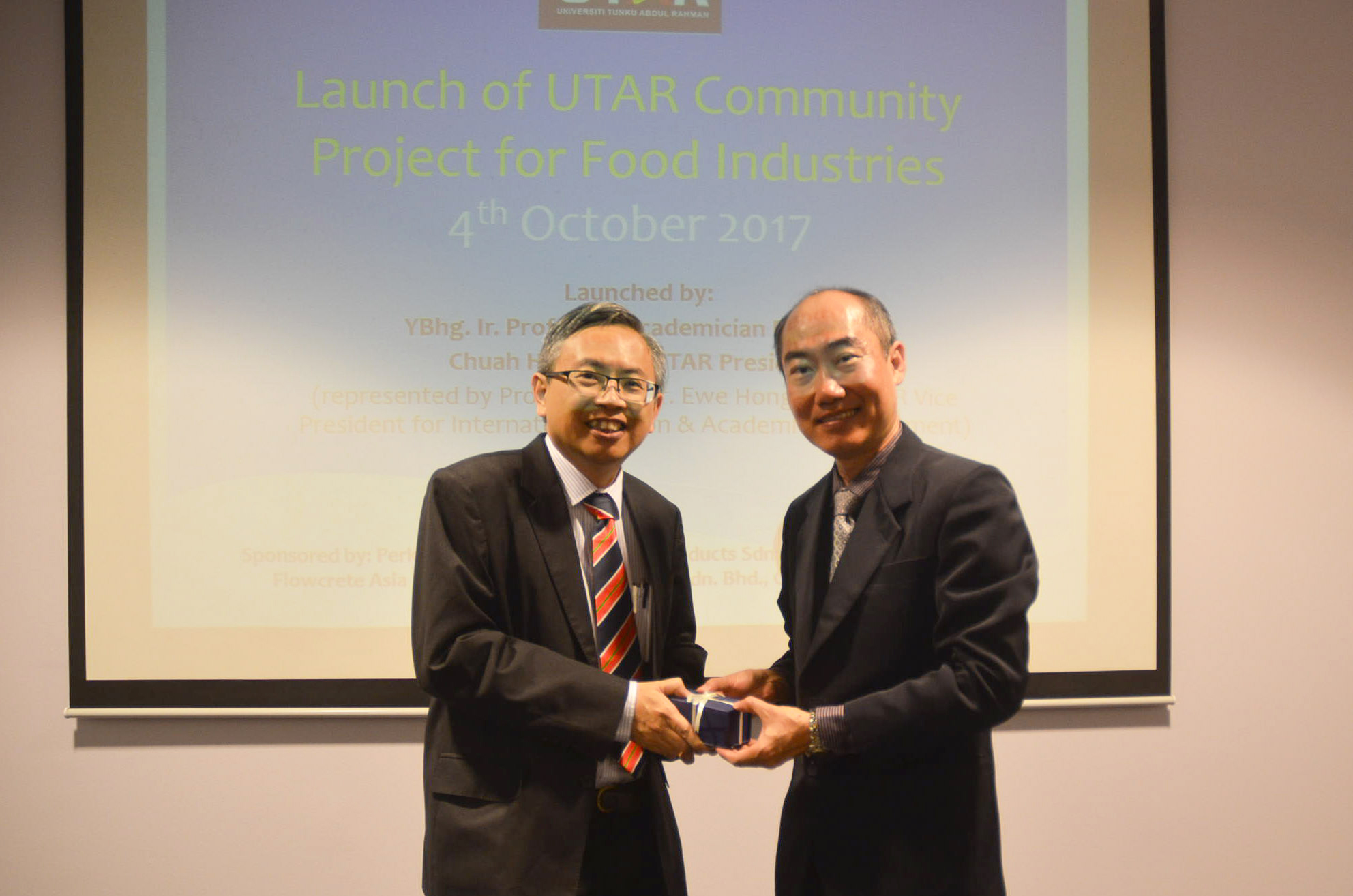
Dr Lim presenting a token of appreciation to Prof Ewe
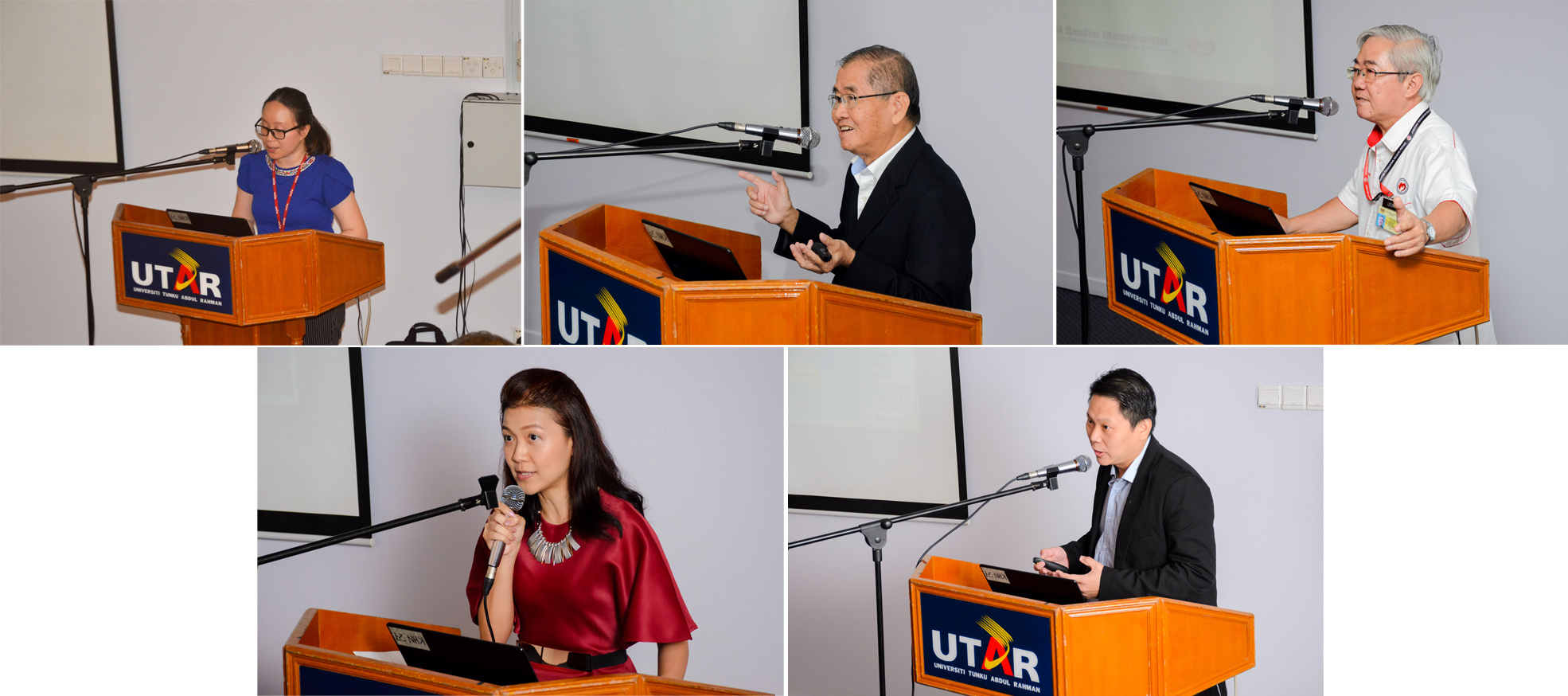
Clockwise from top left: Dr Tan, Lam, Leong, Teh and Lai giving their respective insights on the objectives, functions and roles of the project
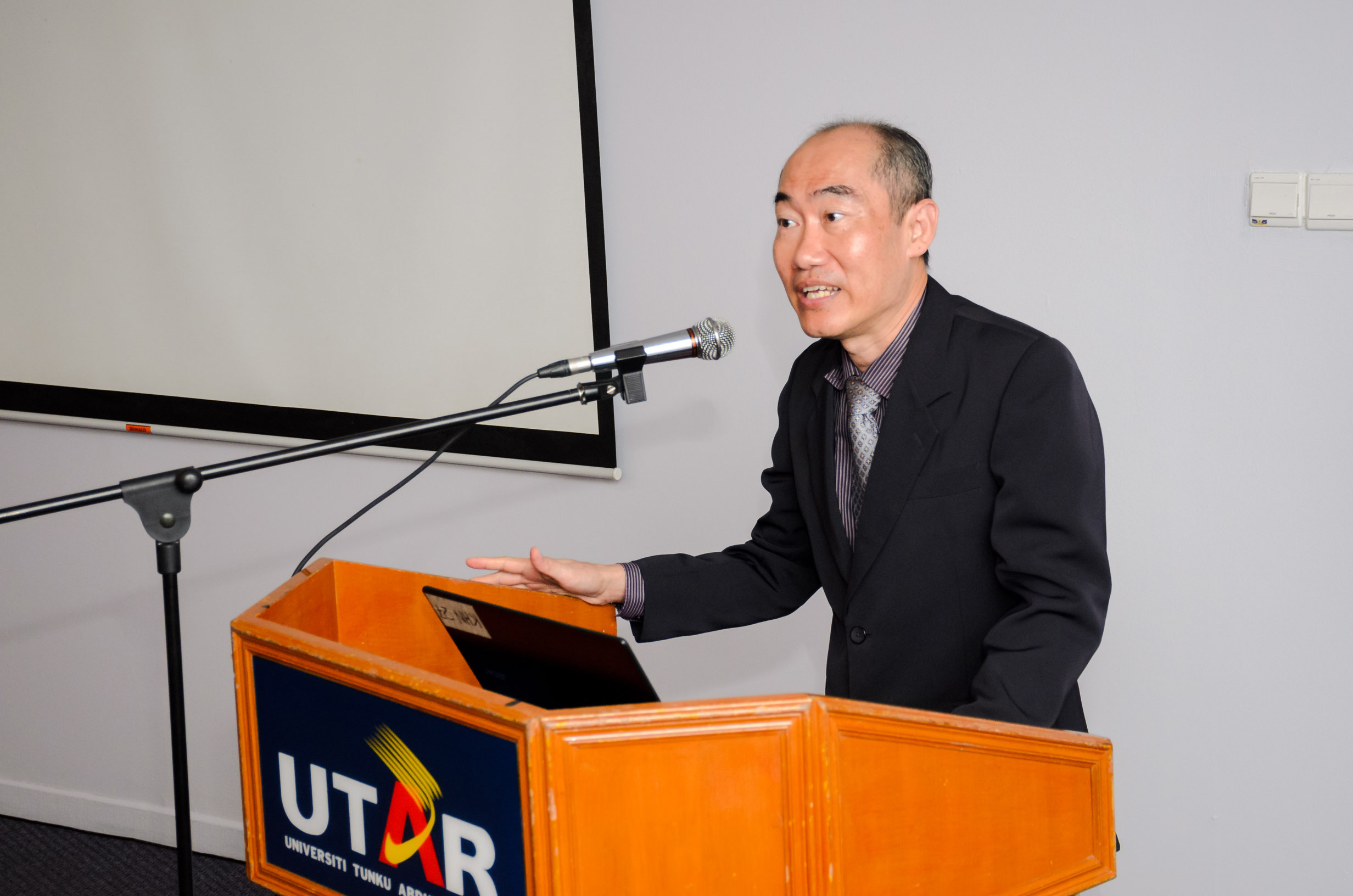
Dr Lim thanking participants for their support

From left: Dr Lim presenting tokens of appreciation to Leong and Teh
© 2019 UNIVERSITI TUNKU ABDUL RAHMAN DU012(A).
Wholly owned by UTAR Education Foundation Co. No. 578227-M LEGAL STATEMENT TERM OF USAGE PRIVACY NOTICE